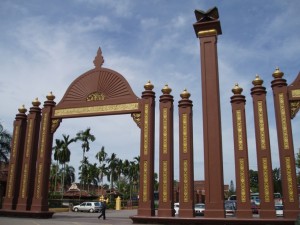Brunei To Launch Second Phase of Educational Improvements
During the launching ceremony of the Second Phase of the Southeast Asia Primary Learning Metric (SEA-PLM) on October 21st, 2014, Brunei announced that it will be increasing the productivity of early child education by designing educational tutorials to aid teachers in creating quality learning experiences. The launching ceremony was held in collaboration with the Southeast Asian Ministers of Education Organization (SEAMEO) and the United Nations Children’s Fund Regional Office East Asia and the Pacific (UNICEF EAPRO). Over 450 policy-makers, academics, and stakeholders from Southeast Asia were in attendance.
Dr. Witaya Jeradechakul, Director of SEAMEO Secretariat stated during the opening ceremony that the SEA-PLM will monitor student achievements ranging from numeracy, literacy, and 21st century global citizenship skills. Brunei will be furthering this goal through the execution of the e-Hiraj Whole School Approach to ICT Development (WISD) project.
According to the Minister of Education, Yang Berhormat Pehin Orang Kaya Seri Kerna Dato Seri Setia (Dr) Hj Awg Abu Bakar Hj Apong, “the WISD project was designed to develop teachers’ capacity to engage in different approaches to teaching which includes knowledge transfer, knowledge sharing, and developing knowledge communities.” In addition, a strong ICT skill set is crucial to identifying a teacher’s capacity to teach and transfer knowledge to students.
ICT is an index published by the United Nations International Telecommunication Union that measures information and technology indicators. Brunei has been using the ICT index to measure and compare the technical and digital skills of the country’s students. If the program is successful, the tools will be shared amongst SEAMO members, increasing the transfer of information and learning skills in the South East Asian region.
Under the new metric system of the WISD project, Brunei hopes to more accurately measure a student’s educational progress and to encourage teachers to become “designers of learning.” Innovative teaching strategies, the development of ICT skills and critical thinking, and collaboration in particular will be highlighted in the system.
Brunei selected 20 schools in the fall of last year to participate in the WISD project. The schools were chosen based upon rigorous reviews by experienced education officers. Their readiness for change was included as an important part of qualifying WISD criteria. Since the selection process, the chosen schools, ranging from sports, technical, and vocational schools, have implemented a wide range of tools to expose their students to ICT skills. One such example is of students performing collaborative research in smaller sized classes. Schools are expected to combine the successes of traditional approaches with that of the digital age and 21st century pedagogies.
SEA-PLM, an initiative established in early 2013, is aimed at supporting the educational development of SEAMEO member countries. Based on shared Association of Southeast Asian Nations (ASEAN) values, the initiative improves the quality of education through system level monitoring while applying culturally appropriate metrics. Brunei’s focus on regional educational monitoring will strengthen the technical collaboration amongst ASEAN member states.
The first phase of the SEA-PLM, which consisted of research reviews to assess the educational system of South East Asia, was presented at the 37th SEAMEO High Officials Meeting in February 2014. In this meeting, SEAMEO participating countries, including Brunei, Thailand, and Malaysia, were identified to participate in the second phase. The goal of the second phase is to develop a working plan for implementing educational frameworks throughout the South East Asian region. Brunei’s creation of teacher tutorials is under the framework of SEA-PLM’s second phase.
In addition, the creation of a strong Steering Committee will be crucial to the success of SEA-PLM Phase 2. “ To make this successful, we have to ensure that the participating countries have strong leadership to involve in this programme,” said YB Pehin Dato (Dr) Hj Awg Abu Bakar. The Steering Committee will include members from Ministry of Education officials from SEAMEO Member countries.
After Phase 2 of SEA-PLM has been completed, draft protocols and tools will be translated into national languages to be distributed amongst member countries in Phase 3. The completion of Phase 3 will make SEA-PLM the first learning metric to be normed and referenced with Southeast Asian children, marking a huge milestone in South East Asian collaborative capabilities.

